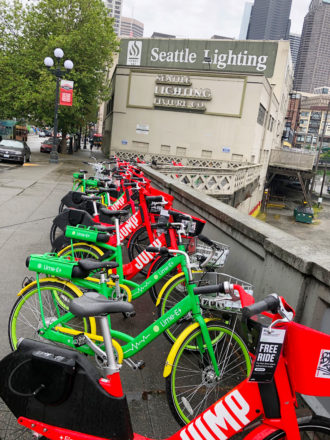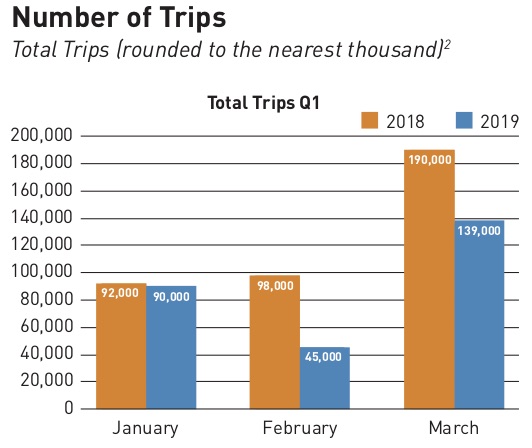Lime and JUMP raise prices, city revokes 2,000 bike permits
 Seattle's ongoing experiment with private, free-floating bike share has changed the landscape for biking in the city, helping to raise city bike counts to record heights.
Seattle's ongoing experiment with private, free-floating bike share has changed the landscape for biking in the city, helping to raise city bike counts to record heights.
Bike share in Seattle has been unprecedentedly successful at increasing the raw number of bike trips taken in this city and growing the number of people who now consider biking as a transportation option for some trips or as a way to access transit.
The way the bike share services work has been evolving quickly and dramatically since launching in 2017. First there were $1 per ride pedal-only bikes from Spin, Lime and ofo. Then ofo and Spin left while Lime transitioned to e-assist bikes with an additional $0.15 per-minute rate. Then Uber's JUMP brought their e-assist bikes and undercut Lime in price by charging the same $0.15 per minute, but without the $1 unlock fee.
The mid-2018 departure of ofo and Spin meant a significant reduction in the total bikes on the streets (nearly 10,000 in early 2018 vs 5,000 to 7,000 in early 2019) along with the increase in price due to the switch to e-assist bikes. SDOT data shows these changes did reduce the number of rides in the first quarter of 2019 compared to 2018:

Note that February 2019 was very snowy, so that big decline is likely a bit of an outlier. Graph from the Quarter 1 2019 bike share progress report (PDF).
Neither Lime nor JUMP have gotten close to hitting their permit limits of 6,667 bikes each. So current bike levels are unlikely to be affected by Seattle taking action against the companies for improperly reporting bike parking issues. As the Seattle Times' Heidi Groover reported, the city penalized the companies by revoking 1,000 bike permits each.
Meanwhile, both Lime and JUMP have increased their per-minute rates to $0.25, which makes bike share less competitive by price compared to other options.
In summer 2017, a 30-minute bike share ride (without an electric assist option) would have cost $1. Today, it would cost $7.50 on JUMP or $8.50 on Lime (though with electric assist). Sure, the $1 fare was artificially low as companies competed intensely to gain users. Perhaps these prices are what is needed to make the business sustainable (companies don't share that kind of information). But an up to 750% cost increase is pretty dramatic. For some trips, that could be more than the cost to hail a car, especially if there are multiple people. For people using these bikes every day, this could add up quickly.
The cost hikes come as companies are shifting focus nationally from bikes to scooters. The hikes also happened just before Lyft is supposed to launch their bike share service in Seattle (currently scheduled for "summer 2019," according to SDOT).
Would a Lyft launch bring more competition and lower prices? Or are the days of very low-cost bike share rides over for good? I guess we'll have to wait and see.
One thing is certain: Seattle's bike (and someday scooter?) share services will keep changing.